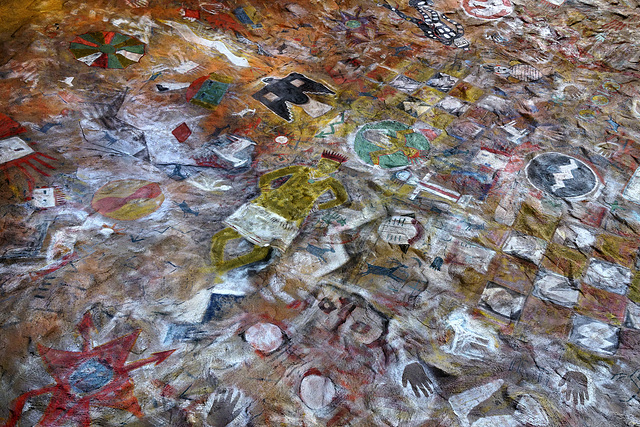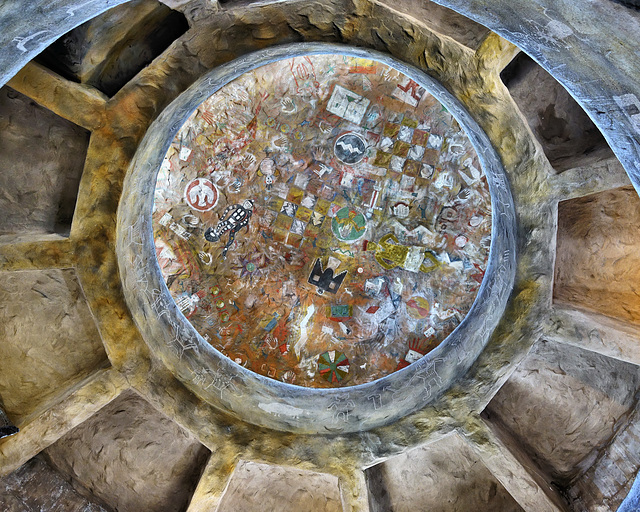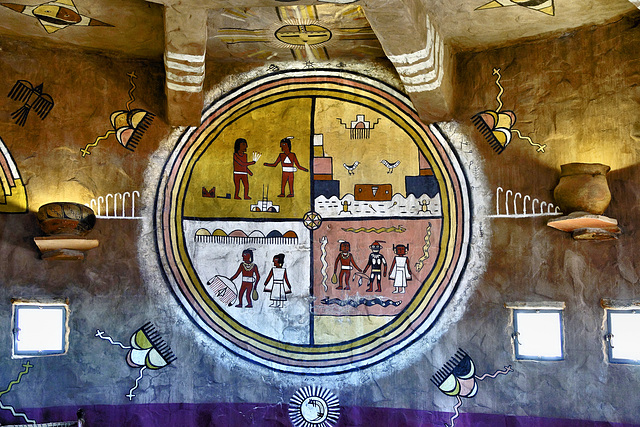Jonathan Cohen's photos
The Road to Nowhere – Verkamp's Visitor Center, Grand Canyon Village, Grand Canyon, Arizona
The Hopi House – Grand Canyon Village, Grand Canyon, Arizona
Hopi House is located on the South Rim of the Grand Canyon, within Grand Canyon National Park in the U.S. state of Arizona. Built in 1904 as concessioner facilities at the South Rim were being developed, it is the first of eight projects at the Grand Canyon that were designed by architect Mary Colter.
Hopi House is a stepped structure executed in sandstone of varying size, texture and coursing. The roof surfaces function as terraces in the same manner as traditional Hopi dwellings. Windows are small and sparse, with doorways on the same small scale. Interior walls are plastered with adobe, while ceilings are composed of saplings, twigs and grass covered with mud. Fireplaces are located in the corners of rooms. The old staircase to the second floor is decorated with murals by an unknown Hopi artist. The second floor houses a shrine, called a kiva, with Hopi religious artifacts. Floors on the second floor were made to look like adobe but were actually cement, which later in the 1930s the floor was laid with hard wood flooring. The third floor was used as an apartment for the building's former managers. It has since been updated and is now used as storage but a number of original features have been preserved. Most of the original furnishings in the main level, were picked out by Colter, have been preserved.
Snow Shelf – Grand Canyon Village, Grand Canyon, Arizona
"Duck on a Rock" – Grand Canyon Village, Grand Canyon, Arizona
From the National Parks Service interpretive panel: "Duck on a Rock? Grand Canyon’s seemingly endless formations evoke shapes that only our imaginations can bring to life. Early mapmakers saw castles and temples in the rocks. Try taking a playful look at Grand Canyon – like imagining the shape of a duck in the rock that stands before you. Decade after decade, visitors come to this spot to look for the ‘Duck on a Rock.’ What do you see? Nothing in Grand Canyon is static. One day, the duck-like shape will take a different form as the power of erosion slowly sculpts it. Come back in 50 or 100 years and see how the duck has transformed."
A Whirl of Glyphs – Watchtower, Desert View, Grand Canyon, Arizona
Petroglyphs on the Ceiling – Watchtower, Desert View, Grand Canyon, Arizona
The Desert View Watchtower rises as an open shaft lined by circular balconies overlooking the central space. Access from balcony to balcony is provided by small stairways. At the top the space is decked over, creating an enclosed observation level with large glazed windows. An open observation area on the roof of this space is now closed to visitors and is used for radio equipment. The steel and concrete structure of the observation level is concealed behind plaster, stone and wood. As you climb the stairs of the tower there are many stories imbedded in the paintings and artwork which decorate the walls. The first gallery, on the first landing, was done by Fred Kabotie, a Hopi from second Mesa. These represent the physical and spiritual origins of Hopi life and which describe the Hopi people’s cultural connection to the Grand Canyon. The circular painting tells the story of a Hopi man who floated down the Colorado River through the canyon in a hollow log. The ceiling images, painted by Fred Geary, are copies of now-destroyed petroglyphs at Abo, New Mexico, and may be their only surviving representation. Small windows – some of which are irregular in shape – are irregularly disposed in the tower’s shaft let beams of light into the lower space. The tower also features a number of "reflectoscopes" – black mirrors to reflect the view of the canyon in a more abstract style, providing visitors an alternative view of the Grand Canyon.
The Physical and the Spiritual Basis of Hopi Life – Watchtower, Desert View, Grand Canyon, Arizona
The Desert View Watchtower rises as an open shaft lined by circular balconies overlooking the central space. Access from balcony to balcony is provided by small stairways. At the top the space is decked over, creating an enclosed observation level with large glazed windows. An open observation area on the roof of this space is now closed to visitors and is used for radio equipment. The steel and concrete structure of the observation level is concealed behind plaster, stone and wood. As you climb the stairs of the tower there are many stories imbedded in the paintings and artwork which decorate the walls. The first gallery, on the first landing, was done by Fred Kabotie, a Hopi from second Mesa. These represent the physical and spiritual origins of Hopi life and which describe the Hopi people’s cultural connection to the Grand Canyon. The circular painting tells the story of a Hopi man who floated down the Colorado River through the canyon in a hollow log. The ceiling images, painted by Fred Geary, are copies of now-destroyed petroglyphs at Abo, New Mexico, and may be their only surviving representation. Small windows – some of which are irregular in shape – are irregularly disposed in the tower’s shaft let beams of light into the lower space. The tower also features a number of "reflectoscopes" – black mirrors to reflect the view of the canyon in a more abstract style, providing visitors an alternative view of the Grand Canyon.
A Petrified Cascade – Viewed from the Watchtower, Desert View, Grand Canyon, Arizona
Counterpoint – Viewed from the Watchtower, Desert View, Grand Canyon, Arizona
Jump to top
- ipernity © 2007-2025
- Help & Contact
|
Club news
|
About ipernity
|
History |
ipernity Club & Prices |
Guide of good conduct
Donate | Group guidelines | Privacy policy | Terms of use | Statutes | In memoria -
Facebook
Twitter










